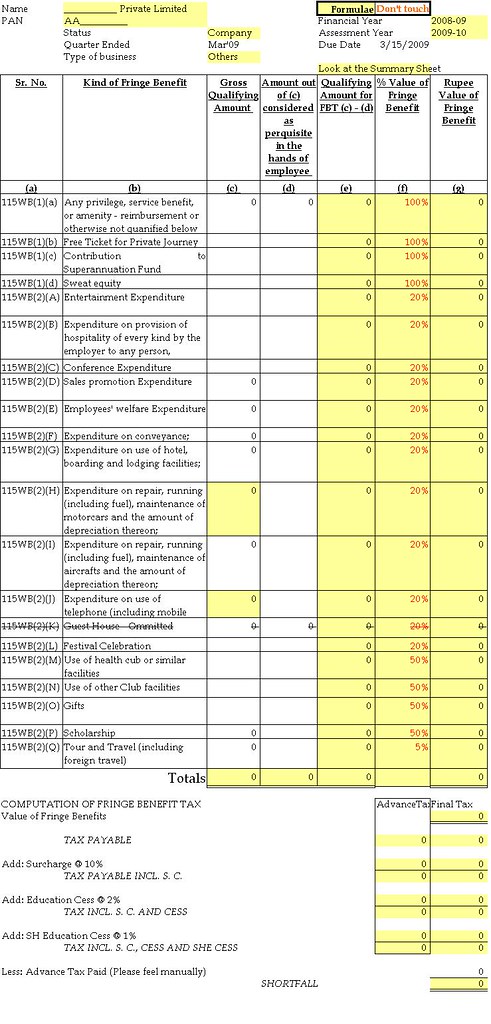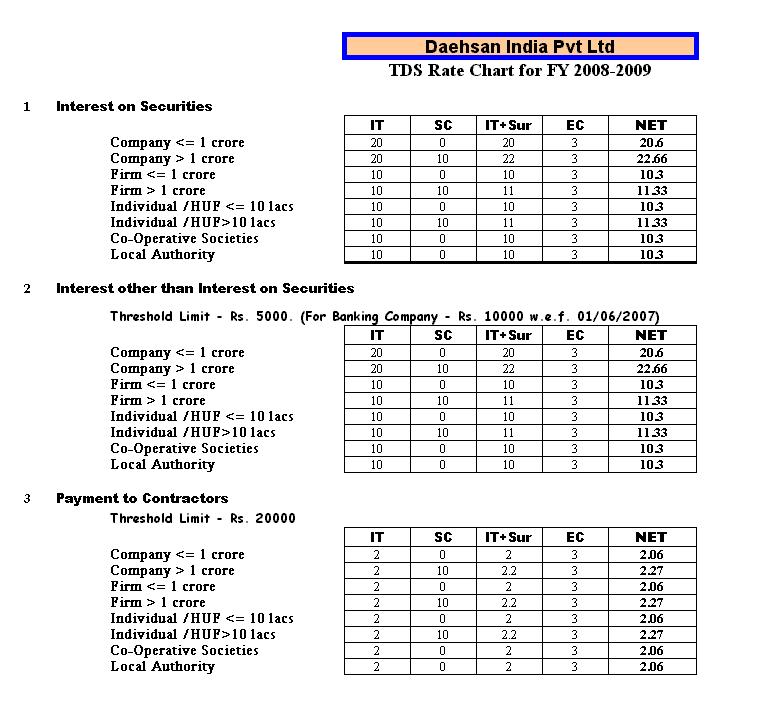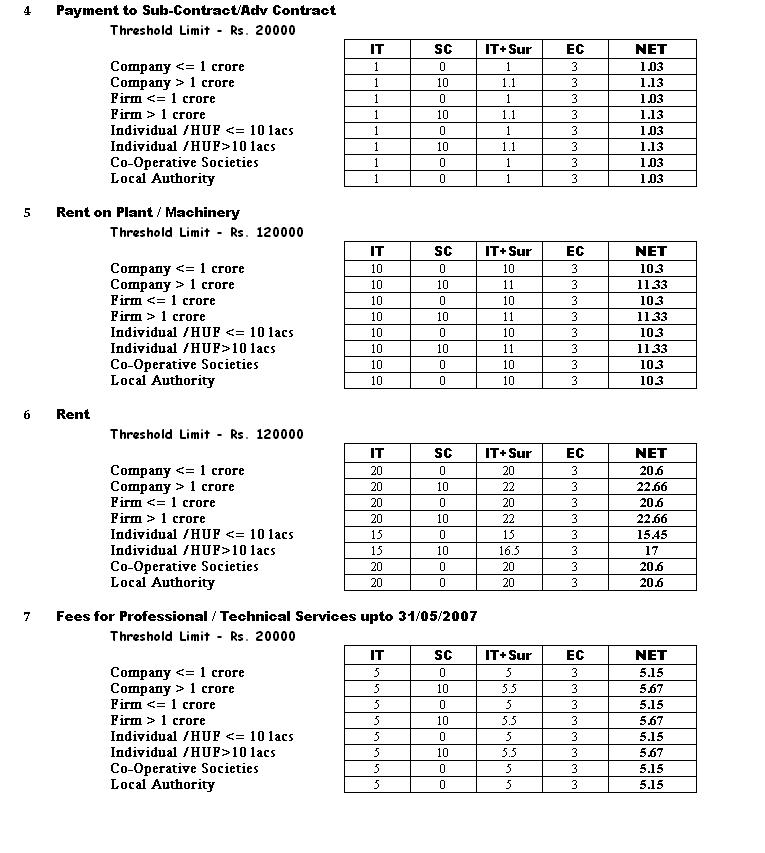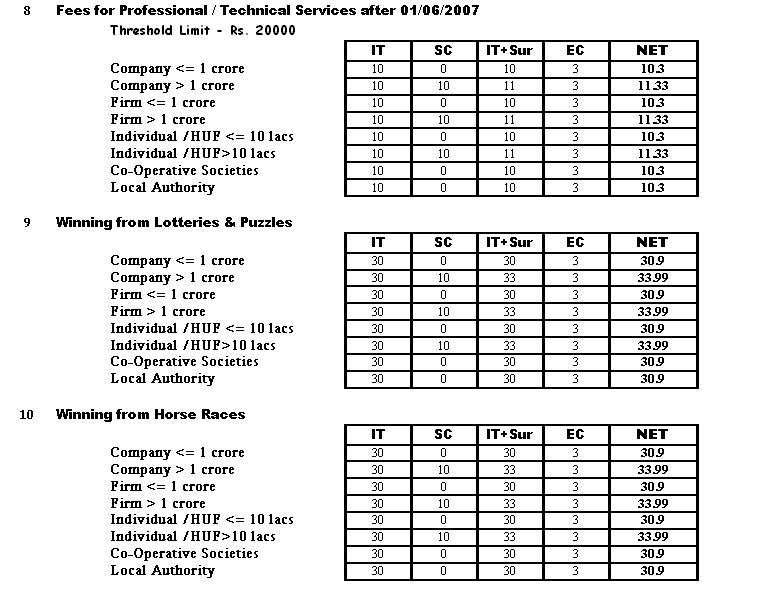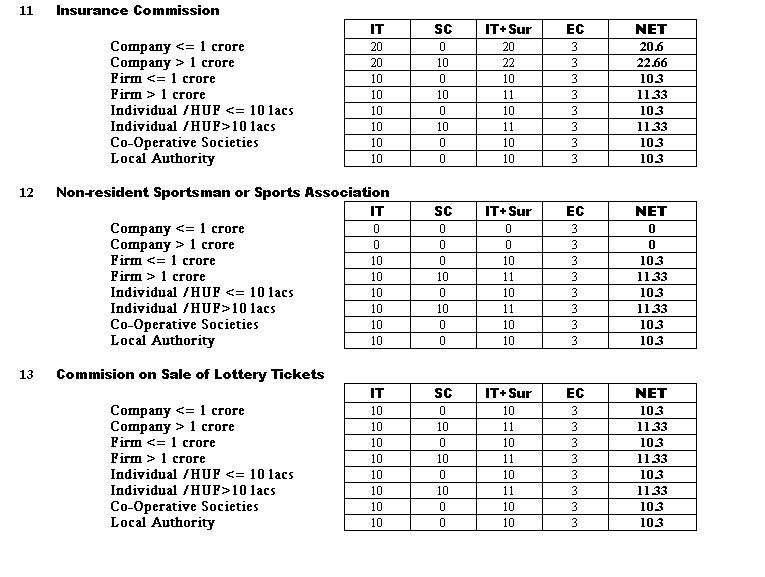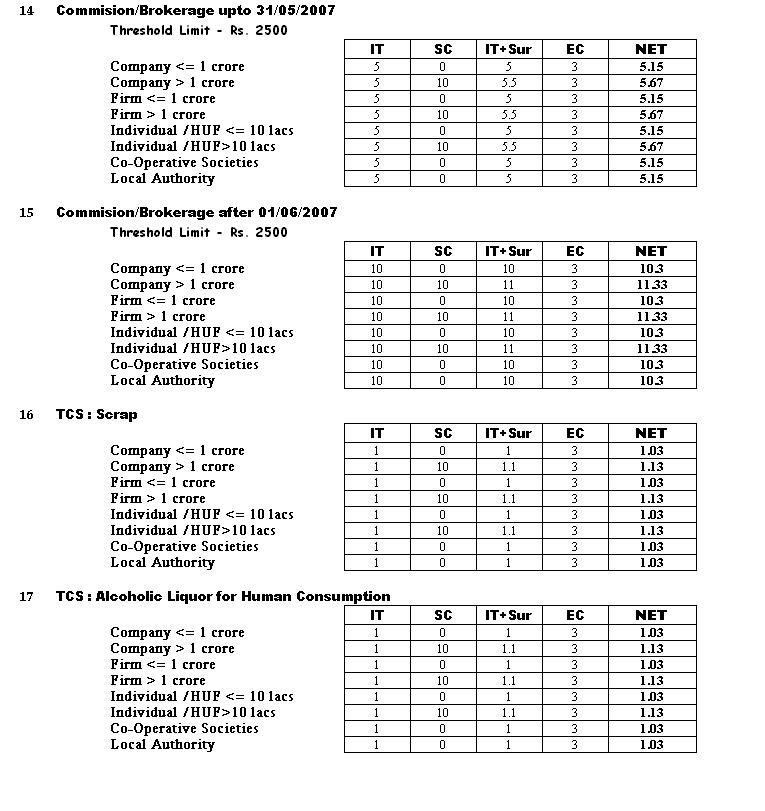Read more ... |
March 22, 2009
March 18, 2009
March 12, 2009
FAQ
FAQ :- A detailed approach to help you understand your taxes better. Chapter Includes :- 1.Basics of Income Tax 2.Salary 3.House Property 4.Capital Gains 5.Income from Other Sources 6.Tax Payments 7.Deductions 8.Clubbing of Income 9.Filing your Returns 10.Payment 1) What is Income Tax? Income Tax is a tax imposed by the Government of India on persons who have earned income in India. When your Income exceeds a prescribed limit, you will have to pay tax 2) How much of my income goes towards taxes? Taxes are charged based on your income. In India, there are slabs within which tax rates are defined: If you earn less than 1,50,000 yearly - 0% If you earn between 1,50,001 & 3,00,000 yearly - 10% If you earn between 3,00,001 & 5,00,000 yearly - 20% If you earn above 5,00,001 yearly - 30% If you are a women taxpayer, income up to 1,80,000 is tax free If you are more than 65 years of age, income up to 2,25,000 is tax free 3) How do I pay income-tax? Income tax is normally paid in the following ways: Salaried Employee: Your employer would have deducted tax on a monthly basis from your salary. You can get the information in your Form 16 and from your Salary slips. Other income: For income received other than from salary, the person from whom you received the income would have deducted tax. This is known as Tax Deducted at Source (TDS). You can get the details of this information from Form 16A, given by the person who deducted tax. Advance Tax: Normally taxes are paid as Advance Tax. Advance Tax is paid in three installments: on 15th September, 15th December and 15th March. If there is still a shortfall, you can pay it before 31st March. You can also pay the shortfall in tax while filing your income tax return. 4) What are the consequences if I do not pay income-tax? If you fail to pay income tax due, you will be charged interest @ 1% per month from 1st April following the financial year, until you pay your tax. 5) What happens if I pay excess tax by mistake? Can I recover it? Yes. If you paid more tax than necessary, you will be refunded the amount. The refund will be processed after your return is reviewed by the Income Tax Department. 6) What are the ways in which I can get my refund? You can get your refund in 2 ways: 1.By cheque 2.By the amount directly credited to your bank account. 7) What is an income tax return (Return of Income)? An income tax return is a prescribed form in which details of your income from 1st April to 31st March and taxes paid on such income are declared to the Income Tax Department. 8) Why should I file an income tax return? / Does everyone need to file income tax return? You need to file an income tax return if your annual income exceeds the exemption limit. 9) What is a PAN? A Permanent Account Number, or PAN for short, is a unique identification number allotted to every tax-payer by the Income Tax Department. 10) Why is a PAN required? Having a PAN is compulsory for all taxpayers. A PAN needs to be mentioned in tax returns, Challan’s for income tax payment and all other communication done with the Income Tax Department. 11) What if I enter an incorrect PAN? The penalty for quoting an incorrect PAN is Rs.10000. 12) Is Income Tax return filing mandatory if I have a PAN number? A PAN Card is mandatory to file an Income Tax Return. Nowadays for several transactions you are required to quote your PAN. However, if your income is below the basic exemption limit, you do not need to file an Income Tax Return simply because you have a PAN. 13) What if I have more than one Permanent Account Number? It is illegal to have more than one Permanent Account Number (PAN). In case you have been allotted multiple PANs by the Income Tax Department, surrender the additional PANs to the Department. 14) What documents do I need to keep handy before I begin preparing my return? Some of the most common documents that are required for preparing income tax return are: a. Copy of PAN Card / PAN Allotment letter b. Last year’s Income Tax Return Acknowledgement c. Form No. 16 d. Housing Loan Repayment Certificate e. Rent Receipts f. Shares Sale Bill / Contract Note & details of corresponding purchases g. Bank Statement / Pass Book h. Copy of tax-saving investments (not declared in Form 16), like i. Life insurance Premium Receipt ii. PPF Challan’s iii. NSC Certificate iv. ULIP Statement v. ELSS Statement vi. Tuition Fees Receipt vii. Medical Insurance Premium Receipt viii. Donation Receipts i. Medical Bills and LTA proofs not declared to your employer j. Form No. 16A (TDS Certificate) k. Tax Payment Challan’s l. Bank Account Information 15) What is a Form 16? It is a certificate issued by your employer giving the following details: Salary income from other sources declared by you deductions claimed by you tax deducted from your salary and paid to the income tax department 16) What If I have more than one employer and I want to file my return? Add up the income from all the employers and enter details of taxes deducted from your salaries, while preparing your return. If you still have any tax payable, pay it before you file your return. 17) What if my employer has deducted excess tax? If your employer has deducted excess tax, you may be entitled to a refund. While preparing your tax return, Taxsmile calculates the final tax amount that is payable by you or the refund that is due to you. You can claim the same by filing the tax return. 18) I have my Form 16. Do I still need to file an Income Tax Return? Form 16 covers only Salary income you have received from your employer. It also certifies that a certain amount of tax has been deducted from your salary income and paid to Central Government on your behalf. Remember that it is only a certificate and not a return. So even if no tax is payable by you in addition to that deducted from your salary, you must still file an income tax return. 19) Do I need to declare all my properties in the return? Yes, even if the property is being used by you or your family. 20) I own more than one property. I have given one of them on rent. How will it affect my taxable income? The rent earned on the property will be taxable. 21) I own more than one property, but they are vacant. How do I declare these in my return? One property of your choice will be treated as tax-free. The rest will be treated as if they were rented out. 22) Do I get any tax benefits if I have taken a loan for construction of property for my residence? Yes, in the following manner if used for construction. Interest paid will become deductible only after you have received possession of Property The interest paid till the date of possession is called Pre construction interest and you can claim a 20% deduction each year, for 5 consecutive years, starting from the year in which you get the possession of the house. 23) Can I claim the entire interest paid on my Housing loan? If the property is used by you or your family then the maximum deductible amount is Rs.150000/-. For other properties the entire amount is deductible. 24) Can I consider my entire EMI as a tax benefit? Your housing loan repayment is done through monthly EMI. This has got 2 components - Interest and Principal. Both are deductible, but separately. Interest can be claimed as deduction, irrespective of the source of the loan. The maximum interest you can claim as a deduction is Rs.1, 50,000/-, if the property is not rented out. The principal repayment can be claimed as deduction only when the loan has been taken from Banks or Financial Institutions. This deduction is available in section 80C within the overall limit of Rs.1, 00,000/-. 25) Will I get tax benefits if I have missed my EMI payments towards the principal and interest? You will be eligible for Interest payable, but to claim principal you have to make payment. 26) Will I get tax benefits if I have taken a loan to purchase a piece of land? There are no tax benefits for loan taken for a piece of land. 27) Can I claim interest on Housing Loan as a tax deduction, even if I have not paid it? Yes you can, provided the interest you have to pay should be for the loan exclusively used for the purchase / construction of the house. 28) Are Stamp Duty, Registration Fees etc. also eligible for tax deduction? Yes. Stamp Duty, Registration Fees and other expenses incurred by you is eligible for deduction under section 80C, subject to an overall limit of Rs.1,00,000/-. 29) If I am loan a co-applicant to the loan but the property is not owned by me but the other co-applicant, who can claim deduction? Tax benefits can be claimed only by the applicant who owns the property. 30) Is there a limit on Home loan interest, if I have rented your property? Interest Limit of Rs.1, 50,000 does not apply to rented property. It is the actual interest you paid that gets deducted, even if it is more than Rs.1, 50,000. 31) What is Capital Gain? Gain on sale of following investment/assets is known as Capital Gain: Shares Units of a mutual fund Bonds/debentures Immovable property Jewellery, paintings etc 32) What is Long term and Short Term Capital Gain? When investments are held for more than 36 months, such gains are termed as Long Term Capital Gain. However, for shares, mutual funds, listed bonds & debentures, zero coupon bonds, the period is 12 months. When investments held for less than36 months, such gains are termed as Short Term Capital Gain. However, for shares, mutual funds, listed bonds & debentures, zero coupon bonds, the period is 12 months. 33) Am I required to pay any tax if I sell my shares after holding them for more than 1 year? When you hold shares for more than 1 year, they become Long Term Capital Assets. Any profit earned is exempt from income tax, if the following conditions are fulfilled: 1. Such shares are sold through a recognized stock exchange. 2. Securities Transaction Tax (STT) has been paid on the sale of such shares. 34) Can I save paying tax when I sell my Residential House? Yes, provided you hold Residential Property for more than 3 years and you comply with the following a) You have either purchased another residential house, one year before the Date of Sale or b) You plan to purchase another residential house within two years from the date of sale; or c) You plan to construct another residential house within three years from the date of sale. In case of (b) or (c), you need to deposit the amount of Capital Gain in a Capital Gain Account Scheme before the due date of filing your income tax return. 35) What is the relevant date for sale of shares - Date of Sale or Date of Transfer from Demat Account? The Date of Sale is relevant for calculating Long Term or Short Term Capital Gain. 36) What is STT? STT stands for Securities Transaction Tax. It is a tax paid for transactions made on a recognized stock exchange. 37) Is STT borne by the buyer or seller? STT is levied on both buy as well as sell transactions. Hence it has to be borne both by the buyer and the seller. 38) Do I get deduction for STT paid? No, you cannot claim STT as an expense while calculating Capital Gains. It is only relevant while determining the tax rate of your Long Term or Short Term Capital Gain. 39) Do I have to declare sale of assets even if it is at No profit no loss? Yes. It is relevant for transactions where STT is not paid and for claiming indexation benefit. 40) What is Fair Market Value? It is the market value of the investment / asset as on 1st April 1981. This value is relevant for Capital Gains, when the investment/asset has been purchased before 1st April, 1981. 41) What all costs should be covered under Improvement Cost? All the expenses paid towards major repairs of the property, for its maintenance and enhancing its life add up to form the Improvement Cost. 42) What are the components of income from other sources? The following are examples of income from other sources: Dividend from shares/units of mutual funds Interest from Fixed Deposits, Debentures, Loans etc. Gifts received from relatives Family Pension, Royalty, Agriculture etc. Rental income from plant, machinery etc. 43) Am I required to also disclose tax-free income while filing my income tax return? Yes, you are required to enter data of all income earned by you during the year. Thus, irrespective of whether such income is taxable or exempt from tax, you should disclose it in your return. 44) Is Interest earned on my Savings Bank account taxable? Yes. Saving Bank interest - however small the amount is - is your income and is taxable. Many taxpayers, usually employees, tend to miss this income while filing income tax return. 45) When do I declare interest from Fixed Deposit? There are 2 options to declare the interest: At the time of maturity of the Fixed Deposit or Every year, on the basis of accrual i.e., interest earned but not yet received 46) Is withdrawal from Public Provident Fund to be declared? No, since withdrawal from Public Provident Fund is not an income. 47) What is Tax Deducted at Source (TDS)? Tax deducted by the person at the time of paying any income is called Tax Deducted at Source (TDS). Examples: Employer deducting tax before paying salary Bank deducting tax before paying you interest on fixed deposits 48) What should I do to claim credit for TDS? You need to obtain a certificate of Tax Deduction from the person who deducted your tax. Enter the income and deduction details from the certificate in your tax return. 49) From where can I check details of tax already paid by me before filing my return? You can view online, the details of tax paid by you and the tax deducted at source on your income. You need to register on NSDL's website www.tin-nsdl.com. 50) What tax benefits can I claim in my return? Certain investments or expenditure made by you can be deducted from your taxable income. Examples: Investments like… Equity Linked Saving Scheme (ELSS) Deposits in Public Provident Funds Investments in Bank or Postal Tax Saving Deposits National Savings Certificates etc. Expenditure like… Premium paid for Insurance Policies (e.g., LIC) Premium paid on medical insurance Principal repayment of home loan Interest paid on higher education loan Charitable contribution etc. 51) Can I claim a tax benefit of life insurance premium paid for my spouse's policy? Yes. You can claim payment of premium on life insurance policies of your spouse, children, and yourself. 52) Is Accident policy premium eligible for any tax deduction? No, not all types of insurance premium you pay are eligible for tax deduction. Life insurance premium paid is eligible for deduction under section 80C and Medical Insurance premium paid is eligible for deduction u/s 80D. However when it comes to Accident Insurance premium, it does not carry a tax benefit. 53) Is interest earned on the PPF account of a minor child be taxed at maturity? Interest earned on a minor child's PPF account is exempt from tax. 54) What are the other deductible investments I can make for my spouse or child? You can claim a deduction for investments in PPF, ULIP and premium for Deferred Annuity Plan. 55) What is the advantage in declaring interest on the NSC every year? By declaring the interest every year, your tax liability is spread out, else you will be taxed on the whole interest on maturity loosing the below advantage. Declaring interest in the first 5 years is also deductible along with Life insurance premium, PPF deposits etc. 56) Can I claim deduction if I forgot to submit proof of my tax- saving investments to my employer? Form 16 is not the end of the story! You can declare such investments in your income tax return. You need to recalculate tax and claim a refund from the Income Tax Department. This is true even for certain allowances like House Rent Allowance, Leave travel Allowance 57) Can I claim medical insurance premium paid both for me and my dependent parents also? Yes. Starting from 1st April 2008 you can claim the benefit of premium paid on both medical policies. 58) Can I get any tax benefit if I have taken a Personal Loan? A personal loan does not give you any tax benefit, neither for interest payment nor for principal repayment. Only a housing loan is eligible for tax benefits on interest payment and principal repayment. 59) What do I need in order to claim charitable contributions (donations)? The charitable institution must have a valid certificate under section 80G from the income tax department. You also need their PAN. 60) Can I claim contributions made to Child Rights and You (CRY)? Yes, you can claim it. 61) What do I need in order to claim tax concessions based on physical disability? You need a certificate in Form No. 10-I from a government recognized medical doctor. 62) If I gift money or property to my spouse or daughter-in-law, is it taxable? There is no tax on the gift. However, income earned by them from the gifted money or property will be added to your taxable income. Filing your Return 63) What are the different methods of filing an Income Tax Return? You can obtain a copy of the appropriate Income Tax Return (ITR) form, calculate your tax, fill in the relevant information and sign the form. Submit the ITR form at the income tax office. You also have the option to prepare and file it online. 64) If I have not filed my return by the due date, can I still file it? You can file a return after the due date. 65) Is any interest charged for delayed filing? Yes. If any tax is payable, you will have to pay penal interest for delayed filing @ 1% per month from the due date of filing till the date you actually file. 66) If I do not file my ITR-V (efiling acknowledgement) within 15 days of efiling, does it make my efiling invalid? E-filing your return without a digital signature requires you to file ITR-V within 15 days. If you miss filing within 15 days, the date of filing your ITR-V will be considered as the date of filing your Income Tax Return. 67) I have not declared my other income to my employer. When do I pay the tax due on it? You have to calculate the tax on all your income. After reducing the TDS, pay the balance tax. If it exceeds Rs.5000, then pay the tax in advance as under: 30% by 15th September of the financial year 30% by 15th December of the financial year The balance 40% by 15th March of the financial year Even if you miss all these dates and pay by 31st March, it will still be considered as Advance Tax payment. You can pay tax after these dates also. However in that case you will have to pay additional interest also. 68) I want to pay income tax. How do I pay it? You can pay the tax by filling up a form called "Challan No.280" and submit it to any Nationalized Bank or pay it online through the website https://onlineservices.tin.nsdl.com/etaxnew/tdsnontds.jsp. 69) I forgot to pay advance tax before 31st March, what should I do? You can still pay the tax before you file your tax return. You will be charged some interest for late payment. 70) I have wrongly paid some Advance Tax / excess tax has been deducted. What should I do? Prepare and submit your tax return. The excess tax will be refunded to you by the tax department. |
Posted by Senthamarai kannan at 1:06 AM 0 comments
Labels: FAQ
Subscribe to:
Posts (Atom)






